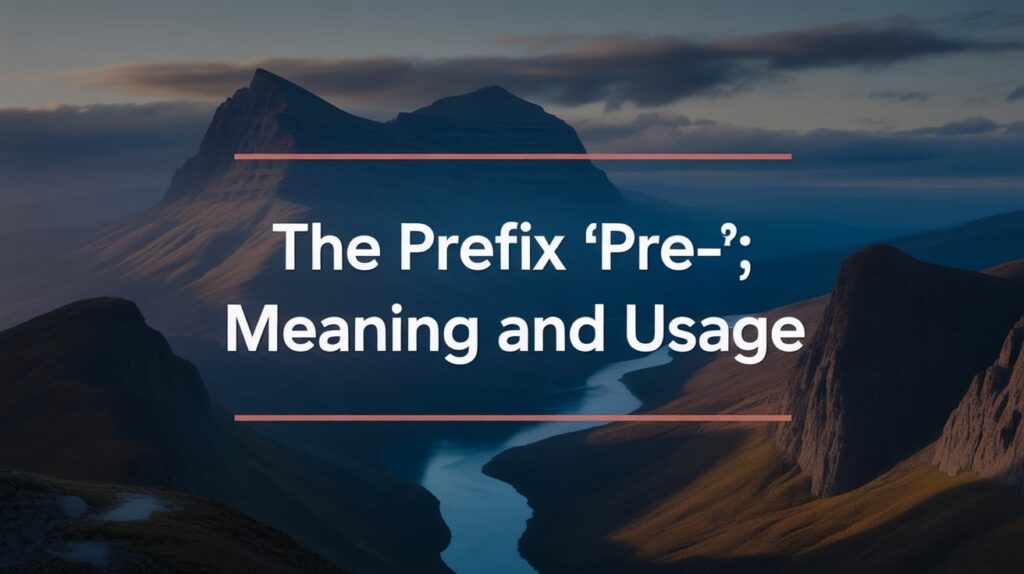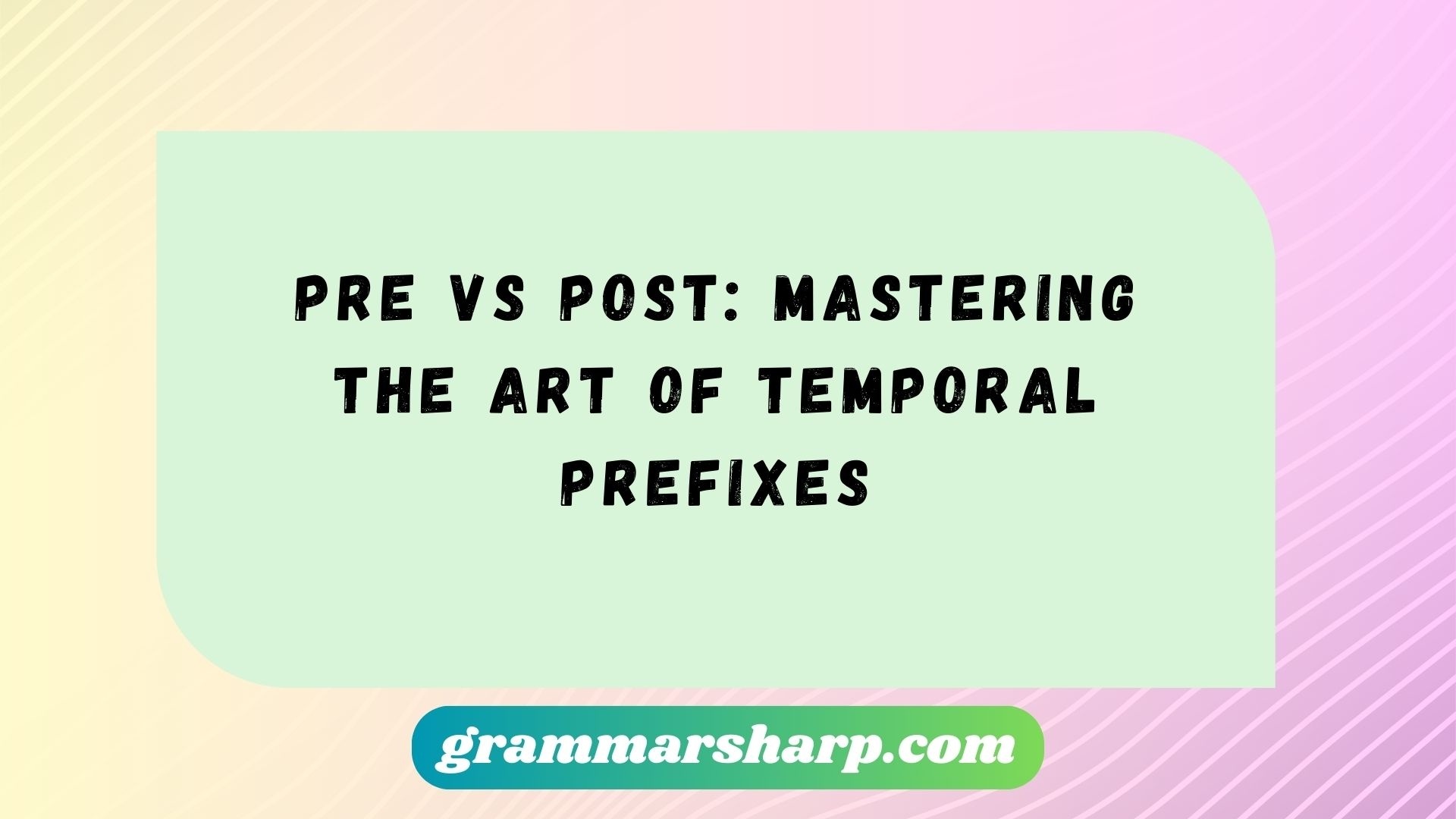Language works like a time machine. With just a few small additions, a word can shift backward or forward in history, pointing us to events before or after something else. Two of the most powerful tools for this are the temporal prefixes pre and post. They may look simple, but they carry enormous weight in communication.
Think about it. When you hear “prewar,” you immediately picture life before a major conflict. Say “postwar,” and your mind jumps to what happened after. These little prefixes save us from long explanations. They compress timelines into compact words that everyone instantly understands.
Whether you’re reading history, diving into medicine, analyzing business trends, or just scanning social media, you’ll notice these prefixes everywhere. They aren’t limited to scholarly contexts either. They show up in marketing campaigns, product launches, and even casual conversations.
By understanding pre vs post, you gain more than vocabulary. You sharpen your ability to read between the lines of culture, history, and context. You see how writers and speakers subtly frame time and perspective.
This article explores what pre and post mean, how to use them correctly, their history, and their cultural importance. You’ll also discover grammar rules, real-world examples, and even some playful word tricks. By the end, you’ll master temporal prefixes and use them like a pro.
What Are Temporal Prefixes?
A prefix is a group of letters added to the beginning of a word to change its meaning. Temporal prefixes specifically relate to time. They indicate whether something occurs before or after an event, a period, or a condition.
- Pre- = before
- Post- = after
For example:
- Preview → to see before viewing.
- Postscript → something written after the main text.
These prefixes are common in English because they save space and make ideas more precise. Instead of saying “education that happens before kindergarten,” we just say preschool.
The Prefix “Pre-”: Meaning and Usage

The prefix pre- comes from the Latin prae, meaning “before.” It signals that something occurs earlier in time, rank, or importance.
Common Patterns with “Pre-”
Words beginning with “pre-” often describe preparation, early stages, or conditions that must exist before something else.
Examples:
- Preheat → heat the oven before cooking.
- Prenatal → care before birth.
- Precaution → action taken before danger strikes.
Everyday “Pre-” Words
Here’s a table with common pre- words:
| Word | Meaning | Example Sentence |
| Preview | To view beforehand | I watched a movie preview. |
| Preschool | School before kindergarten | My child attends preschool. |
| Prehistoric | Before recorded history | Dinosaurs lived in prehistoric times. |
| Prepay | Pay before receiving a service | We had to prepay for the tickets. |
| Premature | Happening before the expected time | The baby was born premature. |
Notice how pre- creates a clear sense of anticipation or preparation.
The Prefix “Post-”: Meaning and Usage
The prefix post- comes from the Latin post, meaning “after.” It indicates that something occurs later in time or follows an event.
Common Patterns with “Post-”
Words with “post-” usually describe consequences, stages after completion, or follow-up actions.
Examples:
- Postgraduate → studies after earning a degree.
- Postscript → extra note after a letter.
- Postwar → period after a war.
Everyday “Post-” Words
Here’s a table with common post- words:
| Word | Meaning | Example Sentence |
| Postpone | Delay until after a planned time | The match was postponed due to rain. |
| Postscript | A note written after the main text | She added a postscript at the end. |
| Postwar | Time after a war | The postwar economy grew quickly. |
| Postnatal | Care after birth | Mothers need postnatal checkups. |
| Posthumous | Occurring after death | He received a posthumous award. |
“Post-” words often point to what follows a milestone, crisis, or event.
Pre vs Post: Spotting the Key Difference
At their core, pre and post are opposites. One marks the before, the other marks the after.
| Prefix | Meaning | Example Pair | Explanation |
| Pre- | Before | Prenatal vs Postnatal | Prenatal = care before birth, Postnatal = care after birth |
| Post- | After | Prewar vs Postwar | Prewar = before war, Postwar = after war |
| Pre- | Before | Presale vs Postsale | Presale = before product release, Postsale = after sale support |
These pairs show how a single prefix changes the timeline.
Real-World Examples of Pre vs Post in Action

Prefixes aren’t just grammar exercises. They shape real-world discussions.
Medicine
- Prenatal care → medical support before childbirth.
- Postnatal care → follow-up and recovery care for mothers and babies.
History
- Prewar Europe vs Postwar Europe → completely different societies shaped by conflict.
Education
- Preschool → early learning before formal schooling.
- Postgraduate studies → advanced learning after graduation.
Business
- Pre-launch marketing → building hype before release.
- Post-launch analysis → reviewing success after release.
Technology
- Pre-pandemic strategies vs Post-pandemic strategies → dramatic shifts in work culture.
These examples highlight how prefixes work as cultural markers, not just grammatical ones.
Grammar and Style Tips for Using Pre and Post
Hyphenation Rules
- Use a hyphen if the base word starts with the same vowel:
- Pre-existing (not preexisting).
- Post-operative (not postoperative).
- Drop the hyphen in common words: preschool, postwar.
Capitalization
- If the word starts a sentence, capitalize it normally: Prehistoric animals roamed freely.
Common Mistakes
- Writing “pre natal” instead of “prenatal.”
- Using “postpone” incorrectly for cancellation. Postpone means “delay,” not “cancel.”
Do’s and Don’ts
- Use pre- for “before,” post- for “after.”
- Check dictionaries for standard hyphenation.
- Don’t assume every “pre” or “post” word is time-related (e.g., “prestige”).
Pre and Post in Cultural and Historical Context
Both prefixes trace back to Latin roots. “Pre” from prae and “post” from post. They entered English through Old French and Latin-based scholarly texts.
Over centuries, they became deeply embedded in legal, academic, and scientific language:
- Precedent in law (something that comes before).
- Postmortem in medicine (after death examination).
In history, these prefixes often define eras:
- Pre-industrial society vs Post-industrial society.
- Pre-Columbian America vs Post-Columbian America.
They help historians, scientists, and researchers frame complex timelines with precision.
Fun with Pre and Post: Wordplay and Puns
Prefixes aren’t always serious. Writers and marketers use them for playful effects:
- Coffee shop slogan: “Pre-caffeinated vs Post-caffeinated — pick your vibe.”
- Fitness ad: “Pre-workout energy, post-workout recovery.”
- Humor: “Precrastinator” → someone who does things way too early.
Such creative uses show the flexibility of these prefixes in everyday humor.
Common Questions About Pre vs Post
Is “pre” always opposite of “post”?
Yes, but only in a temporal sense. “Pre” marks before, “post” marks after.
Can words start with both prefixes?
Yes, but they indicate different timeframes: prenatal vs postnatal.
Are there exceptions?
Some “pre” and “post” words drift from strict time meanings (e.g., prestige).
Why do some “post” words feel formal?
Because many came from Latin medical, academic, or legal contexts.
Conclusion: Mastering Temporal Prefixes
Words like pre- and post- may seem small, but they pack enormous meaning. They tell you at a glance whether something happened before or after. They also bridge history, medicine, business, and everyday life.
When you master these prefixes, you unlock a sharper vocabulary and clearer communication. From prenatal care to postgraduate studies, from pre-pandemic life to post-pandemic changes, these tiny prefixes mark the rhythm of human experience.
So next time you see “pre” or “post,” remember—you’re not just reading letters. You’re reading time itself.
FAQs
What is an example of “pre”?
A preview is an example—it’s a look before the full view.
What is an example of “post”?
A postscript is a note added after the main text.
Are “pre” and “post” only for time-related words?
Mostly yes, but some words evolved to mean more than time.
Which is used more in English?
“Pre-” shows up more in education, medicine, and daily use, while “post-” dominates in historical and scientific terms.
Do other languages use “pre” and “post”?
Yes, many Latin-based languages like Spanish, French, and Italian use them similarly.

